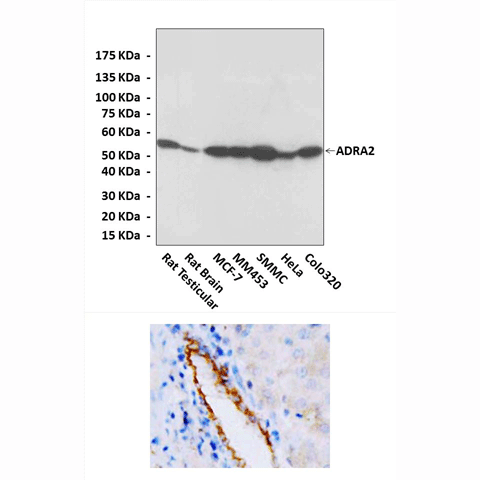Anti-ADRA2: Rabbit Alpha 2 Adrenergic Receptor Antibody |
 |
BACKGROUND Adrenergic receptors (AR) mediate the physiological effects of the biogenic amine hormones/neurotransmitters adrenaline and noradrenaline. These catecholamine messengers have important roles in the regulation of diverse physiological systems. Thus, adrenergic receptors are widely distributed throughout the body. ARs can be divided into three main classes, alpha1-AR, alpha2-AR, and beta-AR, each of which is represented by three subtypes in humans and other mammals (alpha1A, alpha1B, and alpha1D; alpha2A, alpha2B, and alpha2C; beta1, beta2, and beta3). ARs belong to a large family of cell surface receptors that control intracellular second messenger systems by activating guanine nucleotide–binding regulatory proteins (G-proteins). The alpha-adrenergic receptor is the primary adrenergic receptor that causes vasoconstriction with stimulation from an agonist.1 The alpha2A-adrenoceptor (AR) subtype is located both pre- and postsynaptically, mediates adrenaline/noradrenaline functions. The alpha2 adrenergic receptors activate the Gi/o class of guanine nucleotide binding regulatory proteins (G proteins). The activation of the G protein, in turn, regulates several effectors, including adenylyl cyclase (inhibition), calcium channels (stimulation/inhibition), and potassium channels and H+/Na+ antiporter (stimulation).2 It was shown that alpha2 adrenergic receptors play an important role in regulating the neuronal release of norepinephrine through presynaptic feedback inhibition in the locus ceruleus. Therefore, alpha2 adrenergic autoreceptors may underlie some aspects of the pathogenesis and symptomatic expression of depressive illness.3 In addition, Among adrenergic receptor subtypes that regulate lipid mobilization, the alpha2-AR is involved in the inhibition of fatty acid mobilization from adipose tissue.4
REFERENCES
1. Ruuskanen, J. O. et al: J. Neurochem. 94:1559-69, 2005
2. Ampatzis, K. et al: J. Comparat. Neurol. 508:72-93, 2008
3. Wang, Z. et al: J. Affect. Disorders 25:191-6, 1992
4. Garenc, C. et al: Mol. Med. 8:88-94, 2002
2. Ampatzis, K. et al: J. Comparat. Neurol. 508:72-93, 2008
3. Wang, Z. et al: J. Affect. Disorders 25:191-6, 1992
4. Garenc, C. et al: Mol. Med. 8:88-94, 2002
Products are for research use only. They are not intended for human, animal, or diagnostic applications.
Параметры
Cat.No.: | CA1003 |
Antigen: | Short peptide from human ADRA2sequence. |
Isotype: | Rabbit IgG |
Species & predicted species cross- reactivity ( ): | Human, Mouse, Rat |
Applications & Suggested starting dilutions:* | WB 1:1000 IP n/d IHC 1:50 - 1:200 ICC n/d FACS n/d |
Predicted Molecular Weight of protein: | 51 kDa |
Specificity/Sensitivity: | Detects endogenous levels of ADRA2 proteins without cross-reactivity with other family members. |
Storage: | Store at -20°C, 4°C for frequent use. Avoid repeated freeze-thaw cycles. |
*Optimal working dilutions must be determined by end user.
Документы
Информация представлена исключительно в ознакомительных целях и ни при каких условиях не является публичной офертой








